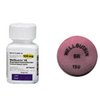 | Zyban Active Ingredient: Bupropion Zyban is an antidepressant medication. Zyban is used to help people stop smoking by reducing cravings and other withdrawal effects. |
| Package | Per Pill | Price | Savings | Bonus | Order |
|---|---|---|---|---|---|
| 150mg × 60 pills | $0.76 | $45.6 | + Viagra | ||
| 150mg × 90 pills | $0.65 | $58.14 | $10.26 | + Levitra |
INDICATIONS
Zyban is an antidepressant medication. Zyban is used to treat major depressive disorder and seasonal affective disorder. Zyban brand of bupropion is used to help people stop smoking by reducing cravings and other withdrawal effects. Zyban may also be used for purposes not listed in this medication guide.
INSTRUCTIONS
Take exactly as prescribed by your doctor. Do not take in larger or smaller amounts or for longer than recommended. Follow the directions on your prescription label.
Bupropion can be taken with or without food.
Do not crush, chew, or break an extended-release tablet. Swallow it whole. Breaking the pill may cause too much of the drug to be released at one time, which could increase side effects including seizures.
If you take Zyban to help you stop smoking, you may continue to smoke for about 1 week after you start the medicine. Set a date to quit smoking during the second week of treatment. Talk to your doctor if you are having trouble quitting after you have used Zyban for at least 7 weeks.
Using nicotine with Zyban may raise your blood pressure and your doctor may want to check your blood pressure regularly. Do not smoke at any time if you are using a nicotine product along with Zyban. Too much nicotine can cause serious side effects.
Do not stop taking bupropion without first talking to your doctor. You may have unpleasant side effects if you stop taking this medication suddenly. This medication can cause you to have a false positive drug screeningtest. If you provide a urine sample for drug screening, tell the laboratory staff that you are taking bupropion.STORAGE
Store at room temperature away from moisture and heat.
Do not take bupropion if you have taken a monoamine oxidase inhibitor (MAOI) such as furazolidone (Furoxone), isocarboxazid (Marplan), phenelzine (Nardil), rasagiline (Azilect), selegiline (Eldepryl, Emsam, Zelapar), or tranylcypromine (Parnate) in the last 14 days. You should not take bupropion if you have:
epilepsy or a seizure disorder;
an eating disorder such as anorexia or bulimia;
if you are using a second form of bupropion; or
if you have suddenly stopped using alcohol or sedatives (such as Valium).
Bupropion may cause seizures, especially in people with certain medical conditions. Tell your doctor about all of your medical conditions.
To make sure you can safely take bupropion, tell your doctor if you have any of these other conditions:
a history of head injury, seizures, or brain or spinal cord tumor;
heart disease, high blood pressure, history of heart attack;
kidney or liver disease (especially cirrhosis); or
bipolar disorder (manic depression).Many drugs can interact with bupropion. Below is just a partial list. Tell your doctor if you are using:
medication used to prevent blood clots, such as clopidogrel (Plavix) or ticlopidine (Ticlid), tirofiban (Aggrastat);
cancer medicine such as cyclophosphamide (Cytoxan, Neosar), doxorubicin (Adriamycin, Doxil), irinotecan (Camptosar), or thiotepa (Thioplex);heart or blood pressure medication such as atenolol (Tenormin), flecainide (Tambocor), metoprolol (Lopressor, Toprol), propafenone (Rythmol), propranolol (Inderal), and others; or
HIV or AIDS medications such as efavirenz (Atripla, Sustiva) or ritonavir (Norvir, Kaletra).
This list is not complete and there are many other drugs that can interact with bupropion. Tell your doctor about all medications you use. This includes prescription, over-the-counter, vitamin, and herbal products. Do not start a new medication without telling your doctor. You may have a higher risk of seizures if you use certain medications together with bupropion. Tell your doctor about all other medications you use, especially:
any other antidepressant, or a medicine to treat a psychiatric disorder;
antihistamines that make you sleepy;
asthma medications or bronchodilators;
birth control pills or hormone replacement estrogens;
bladder or urinary medications such as oxybutynin (Ditropan, Urotrol);
antibiotics such as cefdinir (Omnicef), cephalexin (Keflex), ciprofloxacin (Cipro), amoxicillin (Amoxil, Augmentin), penicillin, and others;
diet pills, a stimulant, or ADHD medication such as Adderall or Ritalin;
insulin or diabetes medications you take by mouth;
medication for nausea, vomiting, or motion sickness;
medications to treat or prevent malaria;
medicines to treat Parkinson's disease, restless leg syndrome, or pituitary gland tumor (prolactinoma);
medicines used to prevent organ transplant rejection;
narcotic pain medication;
a sedative such as diazepam (Valium), and others;
a steroid such as prednisone, and others;
street drugs such as "speed" or cocaine;
theophylline (Theo-Dur, Slo-Bid, Bronkodyl Theolair, Respbid); or
ulcer or irritable bowel medications.It is not known whether bupropion will harm an unborn baby. Tell your doctor if you are pregnant or plan to become pregnant while using this medication. Bupropion passes into breast milk and could be harmful to a nursing baby. You should not breast-feed while you are taking bupropion.
Get emergency medical help if you have any of these signs of an allergic reaction: hives; difficulty breathing; swelling of your face, lips, tongue, or throat.
Report any new or worsening symptoms to your doctor, such as: mood or behavior changes, anxiety, panic attacks, trouble sleeping, or if you feel impulsive, irritable, agitated, hostile, aggressive, restless, hyperactive (mentally or physically), more depressed, or have thoughts about suicide or hurting yourself.
Call your doctor at once if you have a serious side effect such as:
seizure (convulsions); severe blistering, peeling, and red skin rash; fever, swollen glands, rash or itching, joint pain, or general ill feeling; confusion, trouble concentrating; orhallucinations, unusual thoughts or behavior.
Less serious side effects may include:
headache or migraine, dizziness, tremors (shaking);sleep problems (insomnia), loss of interest in sex;
nausea, vomiting, constipation, dry mouth;appetite changes, weight loss or gain; or mild itching or skin rash, increased sweating.
This is not a complete list of side effects and others may occur.
 Wellbutrin SRWellbutrin SR is a medicine used to treat adults with a certain type of depression called major depressive disorder.as low as $0.94
Wellbutrin SRWellbutrin SR is a medicine used to treat adults with a certain type of depression called major depressive disorder.as low as $0.94 NicotinellThis medicine is used to treat nicotine withdrawal symptoms as an aid to stopping smoking.as low as $30.72
NicotinellThis medicine is used to treat nicotine withdrawal symptoms as an aid to stopping smoking.as low as $30.72 WellbutrinWellbutrin (bupropion) is an antidepressant medication. It works in the brain to treat depression.as low as $1.96
WellbutrinWellbutrin (bupropion) is an antidepressant medication. It works in the brain to treat depression.as low as $1.96